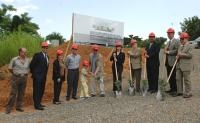In the forefront of the Food Industry
Submitted on 2 September 2006 - 10:42pm
This article is reproduced by CienciaPR with permission from the original source.

By Margarita Santori López
Prensa RUM
This week began the construction of the Center for Agro-Industrial Innovation and Technology (CITAI) in the Unversity of Puerto Rico in Mayagüez (RUM), where a novel complex dedicated to research in the food industry will be located. The modern facilities belong to the School of Agricultural Sciences of the RUM and its projected to be ready in approximately 14 months.
This was revealed in a ceremony celebrated in front of the Center of Pre-school Development where the building that will be named after Alfredo Ramirez de Arellano and Rosell, filántropo, industralist and Puerto Rican humanist will be located. Two years ago the president of the Ramirez de Arellano and Rosell Foundation, engineer Alfredo Ramirez de Arellano Bártoli, gave a donation of $900 thousand for the construction of the complex. Also, the department of Agriculture contributed $600 thousand and the University of Puerto Rico (UPR) will provide the remaining $300 thousand to complete the $1.8 million that the project costs.
“During many years this Foundation has contributed to the development and growth of the sugar industry in Puerto Rico in memory of my grandfather Alfredo Ramirez de Arellano. When the sugar industry disappeared, the board of directors of the Foundation decided to donate great part of its economic resources to the RUM so they could establisha program for agro-industrial investigation”, affirmed to agronomist Ubaldino Ramirez de Arellano. He added that they have participated in the plans and the architectonic design of the building.
On the other hand, the director of RUM, Doctor Jorge Iván Vélez Arocho, thanked the Ramirez de Arellano family for the endorsement and assured that this innovating project will allow supporting of a creative and visionary way for the agricultural sector of the Country.
“With the creation of this center we pretend to unite the efforts of the university community, the government and the private sector in such way that it promotes the creation of agro-industries, that impact our agricultural production and food industry in general”, the Director declared.
“The impact that this project is going to have in our and other places agriculture is going to be very important”, he assured.
Also, doctor Celeste Freytes, in representation of the president of the UPR, lawyer Antonio Garcia Padilla, expressed that “in this project many initiatives of the university’s agenda come together. The promotion of research, the culture of philanthropy, the relation with the ex-alumni and the good architecture, are some of the university’s courses of action for the next decade. This one is an example of success and development”.
On the other hand, the dean of Agricultural Sciences, doctor John Fernandez Van Cleve, emphasized that this is the first facility in the UPR system to be built using external funds and emphasized the multidisciplinary character of the project because it includes four faculties of the RUM: Agricultural Sciences, Engineering, Business Administration, and Arts and Sciences.
The building will have two stories and will be constructed in modules, which will allow enlarging the facilities in the future. It will have research laboratories, a small pilot plant to work on new studies, a conference hall, an experimental kitchen, administrative offices and a distant-learning hall. It will have laboratories for microbiology, dairy and meat products, chemistry, a pilot plant to process fruits and vegetables and one for small scale fermentation, informed doctor Edna Negrón, coordinator of the Science and Food Technology graduate program of the RUM.
“It will be the first pilot plant to develop high technology products of and what it is known like nutraceutic foods, that is to say, the production of functional/medicinal food”, emphasized. She explained that CITAI will work in three directions: as an incubator for new companies; in the development of new products based on student projects and for training on different areas.
Negrón catalogued the project as “a dream come true” after 10 years of gestation. She indicated that about 30 students of Science and Food Technology will benefit directly with the new facilities, as well as students from other departments like Cattle Industry, Horticulture and Agricultural Engineering and Biosystems.
According to the professor, they also hope that in two years they can offer a baccalaureate in Food Sciences.
On the other hand, doctor Lynette Orellana, professor of Food Science and Technology and who was the master of ceremonies in the activity, with difficult voice expressed that CITAI will serve to develop “the fascinating student projects that we know have a great value for the food industry in Puerto Rico. We do not want them to remain in the library as a thesis, but that this center serves as platform so that those projects go to the supermarkets in Puerto Rico and who knows if abroad”.







